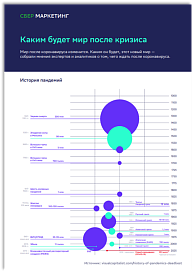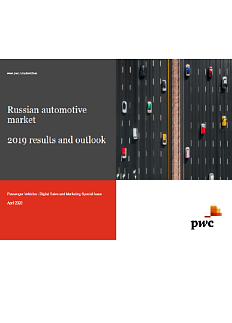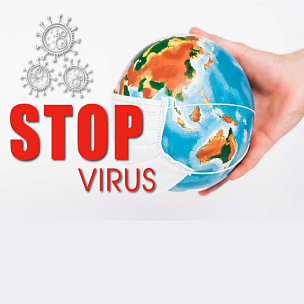The overview, developed by the SBER Marketing agency, analyzes the coronavirus consequences for the world and Russia. In particular, the authors of the overview examine in detail the impact the pandemic has already had on various areas of society, including the economy, consumer habits, work and education, unemployment and information security issues, and provide projections for future developments.
Roscongress Foundation analysts highlighted the main theses of this research, accompanying each of them with suitable fragments of video broadcasts of panel discussions held as part of business programs of the key events hosted by the Foundation.
At present, there are already a number of negative economic consequences caused by the pandemic, which can only be aggravated in case of negative development scenario.
The coronavirus pandemic is already being called the second largest global crisis after World War II. According to WTO forecasts, world trade will decline by 13–32% in 2020. The overview notes that a significant recession is already being observed: for example, according to Fitch forecasts, an annual decline in Russia GDP is expected by 1.4%, while in the eurozone and the United States, the GDP decline in the second quarter will amount to 7-8%.
For Russia, the authorities have also designed two stress scenarios of events development — the soft one and the hard one (which rather look like hard and very hard):
· according to the first scenario, the quarantine will end in summer, and the oil price will be $20 per barrel;
· according to the second scenario, economic activity will not resume until autumn, and oil will cost $10.
McKinsey has developed several scenarios for the world economy, the most pessimistic of which predicts a protracted crisis and the emergence of a black swan/black swans — a combination of damage to the economy caused by the virus, lack of measures to prevent widespread bankruptcies, unemployment and financial crisis.
One of the main negative consequences of the crisis is the rise in unemployment. So, according to the Chamber of Commerce and Industry, 3 million entrepreneurs and 8.6 million people may become unemployed only in Russia. According to RBC (RosBusinessConsulting), almost 30% of the companies have sent their employees on unpaid furlough, over 20% of the companies have reduced their salaries, and the 16% have proceeded to layoffs.
The coronavirus epidemic has had an unprecedented impact on the tourism industry. In Russia, according to Sberbank, spending at travel agencies fell by 96.9%, on air tickets — by 92.6%, on hotels — by 85.3% over the week from 30 March to 5 April.
Importantly, the current crisis is characterized by uncertainty about its end, as it depends on several factors, including the emergence of a vaccine, collective immunity and possible future outbreaks of the virus.
The coronavirus will significantly affect information security.
Now people are highly worried about the uncontrolled spread of personal information amid increased government control (for example, when tracking infected people) and information leakage (as in case of Zoom). There are also concerns about how the authorities will use control instruments after the epidemic.
The review also touches upon the problem of information reliability: a number of companies (YouTube, WhatsApp) are already struggling with the so called infodemic — spread of false information and rumors that cause panic. The overview emphasizes that in the fight against this phenomenon, one can also expect increased state control and, consequently, the development of censorship.
Various spheres of society are being digitized in the midst of involuntary isolation.
Change of people consumer habits is already the case — most users shop online. According to a Nielsen study, 76% of buyers have changed their content-consuming habits during the epidemic. In this vein 21% began to read online books more often, 20% — to spend time in social networks, 18% — to watch videos, 12% — to listen to music and radio.
Remote financial services and online shopping are also growing in popularity. Despite the fact that the increase in unemployment and the decline in income has affected consumer activity (now people in Russia have started to buy 30% less against the backdrop of quarantine), the number of online purchases is steadily growing. Thus, the percentage of consumers who make more than half of their purchases online has increased from 25% to 80% since the beginning of COVID-19.
Users were forced to switch to the Internet in order to work remotely and receive education. The global online education market grew rapidly even before the coronavirus epidemic, and the current circumstances only contributed to the development of this format. It is noted that many universities and companies may continue to practice remote work after the lockdown.
The coronavirus has affected people’s attitudes towards their health and each other.
Amid the epidemic, people increasingly began to think about their health and safety. According to Nielsen, due to the pandemic, 64% of Russians began to wash their hands more often, 33% use sanitizers more often, and 26% regularly clean their homes. The overview assumes that such preventive measures like disposable gloves in shops and thermal imaging cameras at the entrance to public places may remain with us in the future.
The review also notes a paradoxical trend: concurrently with the increased aggression towards people around (due to the fear of infection), unity and mutual assistance are growing. From volunteer shopping for seniors to millions in donations and large-scale campaigns to raise funds to fight the coronavirus, people everywhere are joining together to help each other through difficult times.
The authors believe that after COVID-19 the world will preserve a sense of unity and awareness that every human life is priceless.
We also invite you to get acquainted with other materials posted in COVID-19 and StayHomeEconomy special sections of the Roscongress Information and Analytical System, dedicated to the response to the coronavirus outbreak and possible ways to stabilize the economy in a pandemic.






